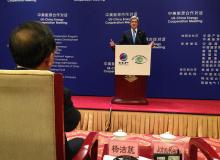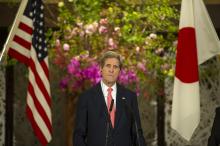
With Chinese State Councilor Yang Jiechi looking on, Secretary of State John Kerry speaks about U.S.-China energy cooperation, in Beijing on April 13, 2013. (Photo: State Department)
(CNSNews.com) – As threats from North Korea makes headlines in northeast Asia and around the world, Secretary of State John Kerry, in his weekend visit to the region, gave high priority to a different subject – one that he is passionate about – “anthropogenic” global warming and his contention that the science is settled.
At talks in Beijing, Kerry and his hosts agreed to elevate the issue of human-caused climate change to the ministerial level in bilateral discussions, a step Kerry said would send a “significant message” globally.
Kerry called climate change a global threat as he addressed an energy cooperation seminar on Saturday also attended by Chinese State Councilor Yang Jiechi.
“We are seeing the science of climate change come back to us now at a rate that is far faster and with far greater levels of damage than anything that scientists predicted 10, 15, 20 years ago,” he stated. “Every prediction that has been made is coming true, but coming true bigger and more dangerously.”
A State Department release on Kerry’s talks in China also highlighted the science-is-settled claim.
“The two countries took special note of the overwhelming scientific consensus about anthropogenic climate change and its worsening impacts, including the sharp rise in global average temperatures over the past century, the alarming acidification of our oceans, the rapid loss of Arctic sea ice, and the striking incidence of extreme weather events occurring all over the world,” it said.
“Both sides recognize that, given the latest scientific understanding of accelerating climate change and the urgent need to intensify global efforts to reduce greenhouse gas emissions, forceful, nationally appropriate action by the United States and China – including large-scale cooperative action – is more critical than ever. Such action is crucial both to contain climate change and to set the kind of powerful example that can inspire the world.”

Secretary of State John Kerry speaks in Tokyo, Japan on April 14, 2013. (Photo: State Department/William Ng)
Climate change also featured in Kerry’s talks with his Japanese counterpart in Tokyo on Sunday.
“The United States and Japan share the view that anthropogenic climate change represents a threat to the security and economic development of all nations,” a State Department release said afterwards.
“On the occasion of their meeting today in Tokyo, Secretary of State John Kerry and Foreign Minister Fumio Kishida expressed serious concern about anthropogenic climate change and its worsening impacts,” it said.
“Moving forward, the governments of the United States and Japan intend to continue to treat climate change as an issue of high priority in the bilateral relationship as we work towards an ambitious and coordinated global response to this serious challenge.”
On its Twitter account, the State Department also drew attention to the high-priority issue, tweeting: #SecKerry and #Japan’s FM Kishida express serious concern about anthropogenic #climatechange, its worsening impacts.
Before becoming secretary of state, then-Senator Kerry positioned himself as a leader on the climate change issue, likening those who questioned the notion of human-induced global warming to flat-earthers.
In a Senate floor speech last August, he declared that the climate crisis was as dangerous as the possibility of Iran developing nuclear weapons or a U.S.-Iran war. He bemoaned the rise the skepticism and blaming it on “a concerted campaign of disinformation.”
During his Senate confirmation hearing last January, the secretary of state-designate described climate change as a “life threatening” issue.
Now leading the administration’s foreign policy, Kerry is in a position to emphasize the issue in his travels and discussions with officials from around the world – and has done so virtually from day one at the State Department.
After he phoned Chinese State Councilor Yang on April 3 to discuss the escalating crisis over North Korea’s threatening behavior, State Department spokeswoman Victoria Nuland said the focus of the conversation was North Korea but “they did talk a little bit about climate change and other issues.”
After meeting his South Korean counterpart in Washington on April 2, Kerry listed pressing topics on the agenda – North Korea, Iran, Syria – then added, “we also are both deeply concerned about addressing the problem of climate change.”
Climate change was similarly on the agenda at Kerry’s talks with his counterparts from Australia (Mar. 18), Norway (Mar. 12), France (Feb. 27), Canada (Feb. 8), as well as during his meeting with U.N. secretary-general Ban Ki-moon on Feb. 14.
“I’ve been working on global climate change every year that I’ve been in the United States Senate, and I was there almost 30 years,” Kerry told a youthful audience in Berlin on Feb. 26.
“Now, this is a challenge of the planet because we need to reduce the levels of emissions if you believe in science, and I believe in science and I believe in the facts. And the facts tell us we need to be moving and responding,” he said.
Addressing the National Geographic Society in Washington on March 18, Kerry said President Obama has put climate change “back on the front burner where it belongs.”
“The science is screaming at us, literally, demanding that people in positions of public responsibility at least exercise the so-called ‘precautionary principle’ to balance the equities and not knowing completely the outcomes at least understand what is happening and take steps to prevent potential disaster,” he said.
Source material can be found at this site.









